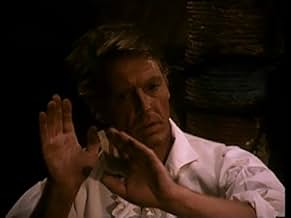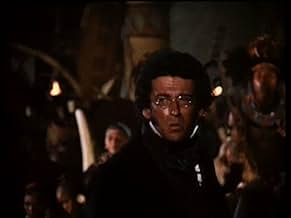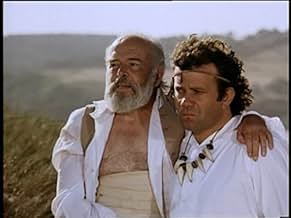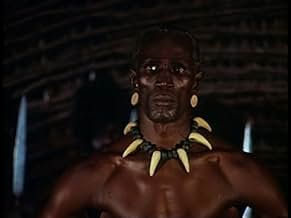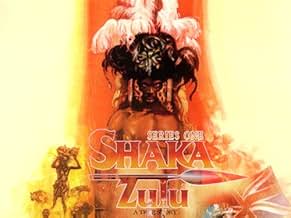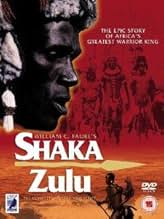IMDb RATING
7.7/10
3.5K
YOUR RATING
A historical account on the life of the Zulu King Shaka.A historical account on the life of the Zulu King Shaka.A historical account on the life of the Zulu King Shaka.
Browse episodes
Featured reviews
i must say i have been having quite a laugh at the ridiculous statements made about this. 1: it was not a propaganda film made by the white government to woo the Zulus, utter trash! the white government wanted nothing to do with it, especially as it was being made by a white south African, it was only made because harmony gold the American TV company got involved. 2: it was not taken from the writings of Francis farewell it was based on henry Finns diary (played by Robert Powell). 3: the savagery certainly was not exaggerated thats me off my soap box. the film is quite brilliant, although not historically correct in many places as Joshua Sinclare has used a lot of poetic licence to make a more interesting story, not that the real story is uninteresting, for television. highly entertaining with very real portrayals of traditional Zulu life, i know i lived with them i am south African. but my saying has always been don't listen to others watch it and make up your own mind, i just don't like people who are ignorant and make comments with out knowing what they are talking about.
It seems that the best actors were the tribesmen, done on location, and very graphic on the gore. Could tell right away that this wasn't American Television. The Aussie's and New Zelanders, definately make better mini-series than we do.
When Nandi and her unborn child are saved by the ancient witch doctor, he proclaims: "A force has been generated that in time will rock the foundation of the African sub-continent."
Indeed the prophecy shaped the event and Shaka was the ruthless founder of southern Africa's Zulu Empire... In less than a decade, the paramount chieftain of the Zulu clan revolutionized the techniques of tribal warfare and fashioned an efficient and terrifying fighting force that devastated the entire region...
Set against the emergence of British power in Africa during the early 19th Century, the film provides some valuable insights into comparative cultures...
Shaka (Henry Cele) is a man of considerable height, thin, with athletic body and white teeth who can read and write... He is a great warrior, tactically, strategically and physically... He rearms his army with a long-bladed, short-shafted stabbing spear, which forced them to fight at close quarters... He goes for extermination, incorporating the remnants of the clans he smashed into the Zulu, making it increase with numbers and power..
The Mini-Series begins with a letter to the British king (George IV) regarding the Zulus' potential threat to the Cape Colony... In an attempt to intimidate Shaka into an alliance with the British empire, the Secretary of War sends a delegation to inner African to meet with the fearful warrior...
We see:
Set against the spectacular panorama of the Zulu tribal homelands, and with graphic violence and frequent nudity, "Shaka Zulu" is a tremendous epic Mini-Series, chronicling the rise and fall of one of the most famous South Africans who has already passed into legend...
Indeed the prophecy shaped the event and Shaka was the ruthless founder of southern Africa's Zulu Empire... In less than a decade, the paramount chieftain of the Zulu clan revolutionized the techniques of tribal warfare and fashioned an efficient and terrifying fighting force that devastated the entire region...
Set against the emergence of British power in Africa during the early 19th Century, the film provides some valuable insights into comparative cultures...
Shaka (Henry Cele) is a man of considerable height, thin, with athletic body and white teeth who can read and write... He is a great warrior, tactically, strategically and physically... He rearms his army with a long-bladed, short-shafted stabbing spear, which forced them to fight at close quarters... He goes for extermination, incorporating the remnants of the clans he smashed into the Zulu, making it increase with numbers and power..
The Mini-Series begins with a letter to the British king (George IV) regarding the Zulus' potential threat to the Cape Colony... In an attempt to intimidate Shaka into an alliance with the British empire, the Secretary of War sends a delegation to inner African to meet with the fearful warrior...
We see:
- The meeting of Nandi, an orphaned princess of the neighboring Langeni clan and Senzangakona, the chief of the then small Zulu tribe... They are instantly attracted to each other... Nandi becomes pregnant, at the same time as Kona's wife, but the marriage did not last... Their marriage violated Zulu custom, and the stigma of this extended to the child...
- The couple separated when Shaka was six, and Nandi takes her son back to the Langeni, where he passed a fatherless boyhood among a people who despised his mother and makes him the butt of endless cruel pranks... He grows up to be bitter and angry, hating his tormentors... The Langeni drove Nandi out, and she finally found shelter with the Dletsheni, a sub-clan of the powerful Mtetwa...
- Shaka rules with an iron hand from the beginning, distributing instant death for the slightest opposition...
- While en route to Shaka's capital, the crew's doctor saves a girl who is in a coma and nearly buried alive by her tribe... Impressed by both the deed and their horses, Shaka agrees to meet with the crew... And so begins the clash of two cultures, two different worlds...
- Shaka, seriously wounded for saving an unknown warrior (King Dingiswayo), is nursed to health by a beautiful Mtwetwa girl...
- Shaka, believing in total annihilation, joins the Mtwetwa army and creates a dangerous weapon for the African warfare...
- Shaka grants Port Natal, with its ivory rights, to the British crew after he is saved by the crew's doctor from an assassination attempt...
- Shaka's mighty army saving the British delegation in a battle against thousands of Ndwandwe warriors... To test the alliance and allegiance of the British delegation, Shaka orders them into battle alone against the Ndwandwe warriors...
- With his mother's death Shaka becomes openly psychotic... Shaka rules by the sheer force of his personality, building, by scores of daily executions, a fear so profound that he could afford to ignore it...
Set against the spectacular panorama of the Zulu tribal homelands, and with graphic violence and frequent nudity, "Shaka Zulu" is a tremendous epic Mini-Series, chronicling the rise and fall of one of the most famous South Africans who has already passed into legend...
I must say I was sorry when I got to the 10th and last episode of "Shaka Zulu". I totally agree with the review by njmollo, very good. The acting of Shaka by Henry Cele is really what made the movie as good as it was and I could not think of anyone else acting as Shaka after having seen Henry Cele as Shaka, it has to be the top casting and acting ever. I find it incredible disappointing that when I look up Shaka Zulu the first actors mentioned are the white English actors, not Henry Cele??? Not saying that the acting by the English was not good but certainly not superior to all the black actors who were very good, such a pleasure to watch as was the portrayal of the Zulu culture and lifestyle. Loved it.
Thinking of South-Africa and the 1980s in one context, three things come to mind: apartheid, boycott and the mini-series "Shaka Zulu". I'd place this among the best mini-series of the 80's and 90's, among shows like "Shogun", "Tai-Pan", "Roots" and "North and South". "Shaka Zulu" has bit from all of them. It's got history; it's got adventure and action, it has compelling characters and story lines that keep you glued to the screen.
Shaka has most often been described as the Napoleon of Africa", which isn't incorrect, yet, I myself do like to see him as the King Arthur of South Africa. This is mainly due to having read Thomas Mofolos "Chaka Zulu" prior to having seen the TV-series. If you're the reading type, I recommend you to pick it up; it's not only a masterpiece of storytelling, but combines history and mysticism perfectly. Some of the mystic elements have made it into the series (the prophecy of Shaka's rise to power; the forging of Shaka's spear), but generally the story of the TV-show is rooted in reality.
What's to be said about the actors? Well, people like Edward Fox, Robert Powell or Fiona Fullerton are beyond dispute, doing a fine job as would be expected. Same goes by short but poignant guest-appearances by the likes of Sir Christopher Lee, Trevor Howard and Roy Dotrice (superb as a decadent King George IV) but the real kudos must go to the South African cast which, despite being mainly laymen actors, come across as convincingly and authentic as they come.
Former South-African football hero Henry Cele embodies Shaka Zulu like Helmut Berger embodied King Ludwig II of Bavaria, imposing and final. Dudu Mkize virtually steals the scenes she's in, with a mix of grace and dignity that is rare to see on modern TV or Conrad Magwaza as Shakas father Senzagakona and Gugu Nxumalo as Shakas feline-like aunt Mkabayi. Sadly, most of those actors were never seen on screen again; Cele starring in a couple of low-budget action / horror flicks (among them "The Ghost and the Darkness), same goes for Mkizi and for Magwaza (apart in a guest-appearance in a film about Albert Schweizer) and Nxumala, "Shaka Zulu" that remained their only appearance on the silver screen.
In essence, this is a (mini)-series that makes you feel sad once you've reached the final episode: sad that it's over and that there is no more. One wishes it would have gone on, that one could have seen more of the characters, their stories, and more of the rich Zulu culture and its history.
I'd give it 10/10 points if it wasn't for the abrupt, sudden ending, which comes as a bit of a let-down, so 9 from 10 will have to do.
Shaka has most often been described as the Napoleon of Africa", which isn't incorrect, yet, I myself do like to see him as the King Arthur of South Africa. This is mainly due to having read Thomas Mofolos "Chaka Zulu" prior to having seen the TV-series. If you're the reading type, I recommend you to pick it up; it's not only a masterpiece of storytelling, but combines history and mysticism perfectly. Some of the mystic elements have made it into the series (the prophecy of Shaka's rise to power; the forging of Shaka's spear), but generally the story of the TV-show is rooted in reality.
What's to be said about the actors? Well, people like Edward Fox, Robert Powell or Fiona Fullerton are beyond dispute, doing a fine job as would be expected. Same goes by short but poignant guest-appearances by the likes of Sir Christopher Lee, Trevor Howard and Roy Dotrice (superb as a decadent King George IV) but the real kudos must go to the South African cast which, despite being mainly laymen actors, come across as convincingly and authentic as they come.
Former South-African football hero Henry Cele embodies Shaka Zulu like Helmut Berger embodied King Ludwig II of Bavaria, imposing and final. Dudu Mkize virtually steals the scenes she's in, with a mix of grace and dignity that is rare to see on modern TV or Conrad Magwaza as Shakas father Senzagakona and Gugu Nxumalo as Shakas feline-like aunt Mkabayi. Sadly, most of those actors were never seen on screen again; Cele starring in a couple of low-budget action / horror flicks (among them "The Ghost and the Darkness), same goes for Mkizi and for Magwaza (apart in a guest-appearance in a film about Albert Schweizer) and Nxumala, "Shaka Zulu" that remained their only appearance on the silver screen.
In essence, this is a (mini)-series that makes you feel sad once you've reached the final episode: sad that it's over and that there is no more. One wishes it would have gone on, that one could have seen more of the characters, their stories, and more of the rich Zulu culture and its history.
I'd give it 10/10 points if it wasn't for the abrupt, sudden ending, which comes as a bit of a let-down, so 9 from 10 will have to do.
Did you know
- TriviaThis has been the most frequently broadcast TV mini-series in the U.S. By 1992, over 350 million viewers had seen it. This mini-series dislodged The Hunters (1957) and Les dieux sont tombés sur la tête (1980) and its sequels as the prime shaper of American perceptions of "tribal" history in southern Africa. The series even achieved cult status. The U.K. actors and actresses who worked on the project were nearly blacklisted by the U.N.
- Alternate versionsAlso released on video in an edited, 'feature length' version.
- ConnectionsFollowed by Shaka Zulu: The Citadel (2001)
- SoundtracksWe Are Growing
By Patric van Blerk, Julian Laxton, Margaret Singana and David Pollecutt (as Dave Pollecutt)
Sung by Margaret Singana and the Baragwanath Choir
- How many seasons does Shaka Zulu have?Powered by Alexa
Details
Contribute to this page
Suggest an edit or add missing content








